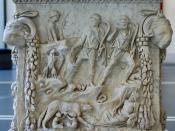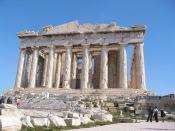In ancient civilizations, the religion of a people was a sacred thing that ruled the livelihood of the followers of that religion. The Gods and Goddesses of ancient Rome all had different roles, personalities, and characteristics that not only explained unknowns to the Roman people, but also gave them role models to follow, rules and moral guidelines, but gave the followers a feeling of connection to their deities by portraying them as humans, both in the physical like, and in personality. The major Gods and Goddesses will be the topic of discussion, as we explore each of their roles, meanings, flaws, and origins.
The first deity of discussion will be Jupiter, the king among the Roman Gods and Goddesses. According to Roman mythology, Jupiter was the god among gods in their religion, and was the son of Saturn, the god of agriculture. Also, according to Roman mythology, Jupiter rebelled against his father, Saturn, and took control of the earth and the skies.
Jupiter had changing roles in the Roman religion, as to fit the current happenings in Rome. Most celebrated was "Jupiter Optimus Maximus", which referred to ruler ship over the universe, and as the god who distributes the laws. Other titles that Jupiter carried at times include "Juptier Electius": god of thunder and storms, "Jupiter Liber": god of creative forces, and "Jupiter Victor": the warrior god.
Next is Jupiter's sister and wife, Juno. Also born of Saturn according to Roman mythology, she married her brother Jupiter, and became the Queen of the gods and goddesses (relationships between members of the same family in ancient Rome was not considered odd or out of the ordinary). Juno was the goddess of the heaven and the moon, and also the protector of women during marriage, and childbirth. She was also known as...


